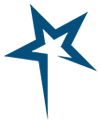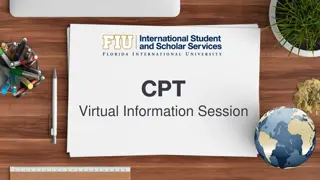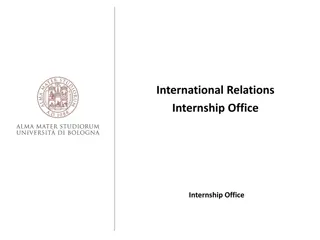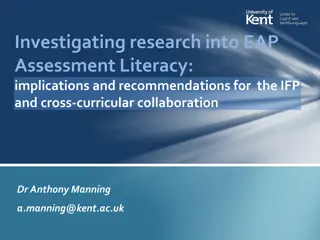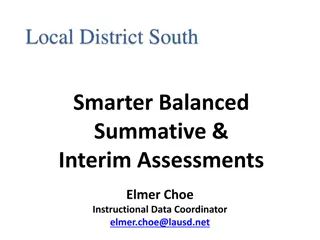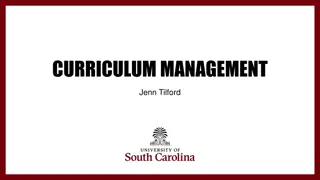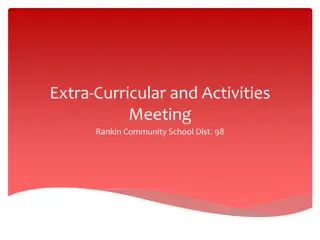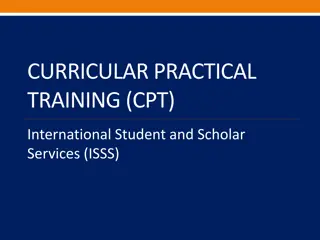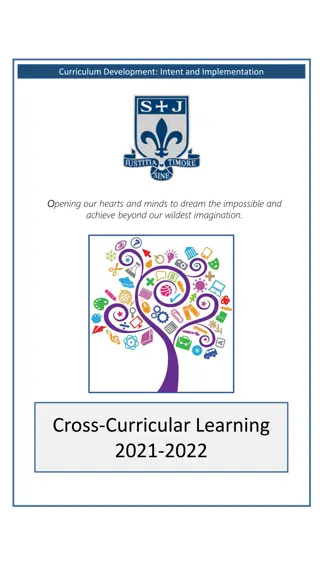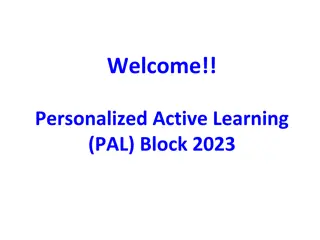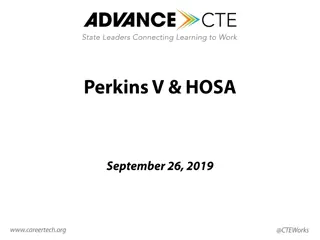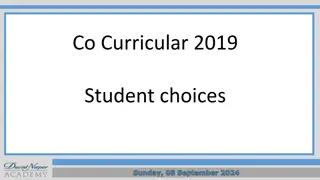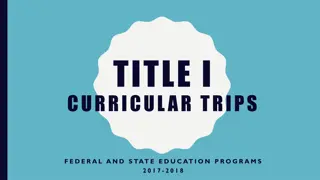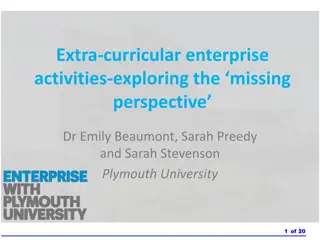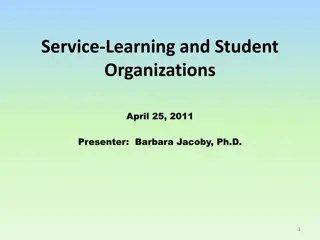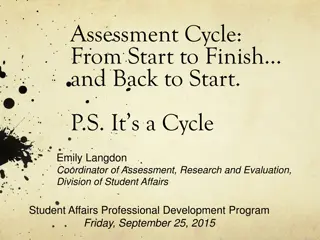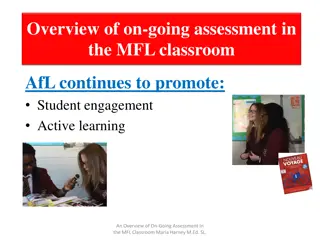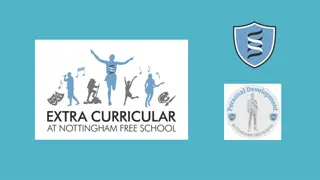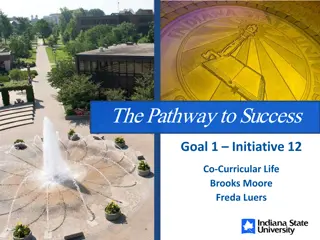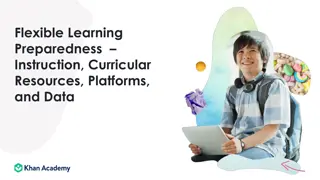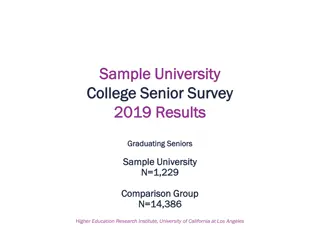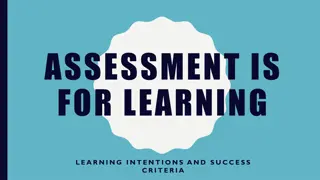Assessment of Student Learning in Co-Curricular Programs
This content discusses the importance of assessing student learning in co-curricular programs and outlines principles of good practice for effective assessment. It highlights the systematic collection of information to make informed decisions for enhancing learning outcomes. Key points include the role of educational values, multidimensional understanding of learning, clear program purposes, ongoing assessment, and community involvement for improvement. Various resources and references provide insights into the assessment process for better educational outcomes.
Download Presentation

Please find below an Image/Link to download the presentation.
The content on the website is provided AS IS for your information and personal use only. It may not be sold, licensed, or shared on other websites without obtaining consent from the author.If you encounter any issues during the download, it is possible that the publisher has removed the file from their server.
You are allowed to download the files provided on this website for personal or commercial use, subject to the condition that they are used lawfully. All files are the property of their respective owners.
The content on the website is provided AS IS for your information and personal use only. It may not be sold, licensed, or shared on other websites without obtaining consent from the author.
E N D
Presentation Transcript
Assessment of Student Learning Co-Curricular Programs Jo Lynn Autry Digranes Coordinator for Assessment
Presentation Outline Definition Principles of Good Practice for Assessing Student Learning American Association for Higher Education (AAHE) Why Do We Assess? HLC Statement on Student Learning, Assessment, and Accreditation Fundamental Questions Linked to Reading Process Assessment -- Co-Curricular Programs Digranes, OCU Assessment 2014
Assessment of Student Learning The systematic collection of information about student learning, using the time, knowledge, expertise, and resources available, in order to inform decisions about how to improve learning. Walvoord, B. E. (2004). Assessment clear and simple A practical guide for institutions, departments, and general education. San Francisco, CA: Jossey-bass A Wiley Imprint. Digranes, OCU Assessment 2014
9 Principles of Good Practice for Assessing Student Learning 1. The assessment of student learning begins with educational values. 2. Assessment is most effective when it reflects an understanding of learning as multidimensional, integrated, and revealed in performance over time. American Association for Higher Education (AAHE). Authors: Alexander W. Astin; Trudy W. Banta; K. Patricia Cross; Elaine El-Khawas; Peter T. Ewell; Pat Hurchings; Theodore J. Marchese; Kay M. McClenney; Marcia Mentkowski; Margaret A. Miller; E. Thomas Moran; Barbara D. Wright, 1992. Digranes, OCU Assessment 2014
9 Principles of Good Practice for Assessing Student Learning 3. Assessment works best when the programs it seeks to improve have clear, explicitly stated purposes. 4. Assessment requires attention to outcomes but also and equally to the experiences that lead to those outcomes. American Association for Higher Education (AAHE). Authors: Alexander W. Astin; Trudy W. Banta; K. Patricia Cross; Elaine El-Khawas; Peter T. Ewell; Pat Hurchings; Theodore J. Marchese; Kay M. McClenney; Marcia Mentkowski; Margaret A. Miller; E. Thomas Moran; Barbara D. Wright, 1992. Digranes, OCU Assessment 2014
9 Principles of Good Practice for Assessing Student Learning 5. Assessment works best when it is ongoing not episodic. 6. Assessment fosters wider improvement when representatives from across the educational community are involved. American Association for Higher Education (AAHE). Authors: Alexander W. Astin; Trudy W. Banta; K. Patricia Cross; Elaine El-Khawas; Peter T. Ewell; Pat Hurchings; Theodore J. Marchese; Kay M. McClenney; Marcia Mentkowski; Margaret A. Miller; E. Thomas Moran; Barbara D. Wright, 1992. Digranes, OCU Assessment 2014
9 Principles of Good Practice for Assessing Student Learning 7. Assessment makes a difference when it begins with issues of use and illuminates questions that people really care about. 8. Assessment is most likely to lead to improvement when it is part of a larger set of conditions that promote change. American Association for Higher Education (AAHE). Authors: Alexander W. Astin; Trudy W. Banta; K. Patricia Cross; Elaine El-Khawas; Peter T. Ewell; Pat Hurchings; Theodore J. Marchese; Kay M. McClenney; Marcia Mentkowski; Margaret A. Miller; E. Thomas Moran; Barbara D. Wright, 1992. Digranes, OCU Assessment 2014
9 Principles of Good Practice for Assessing Student Learning 9. Through assessment, educators meet responsibilities to students and to the public. + 1 -- Banta, Lund, Black & Oblander, 1996: 10. Assessment is most effective when undertaken in an environment that is receptive, supportive, and enabling. American Association for Higher Education (AAHE). Authors: Alexander W. Astin; Trudy W. Banta; K. Patricia Cross; Elaine El-Khawas; Peter T. Ewell; Pat Hurchings; Theodore J. Marchese; Kay M. McClenney; Marcia Mentkowski; Margaret A. Miller; E. Thomas Moran; Barbara D. Wright, 1992. Digranes, OCU Assessment 2014
Higher Learning Commission HLC Statement on Student Learning, Assessment, and Accreditation Fundamental Questions for Conversations on Student Learning Six fundamental questions serve as prompts for conversations about student learning and the role of assessment in affirming and improving that learning: 1. How are your stated student learning outcomes appropriate to your mission, programs, degrees, and students? What evidence do you have that students achieve your stated learning outcomes? In what ways do you analyze and use evidence of student learning? How do you ensure shared responsibility for student learning and for assessment of student learning? How do you evaluate and improve the effectiveness of your efforts to assess and improve student learning? In what ways do you inform the public and other stakeholders about what students are learning---and how well? Higher Learning Commission. (2007) Statement on Student Learning, Assessment and Accreditation. HLC Website: http://ncahlc.org/Information-for-Institutions/publications.html 2. 3. 4. 5. 6. Digranes, OCU Assessment 2014
HLC Fundamental Questions How are your stated student learning outcomes appropriate to your mission, programs, degrees, and students? OCU Mission Emphasis Scholarship Service Culturally rich community Moral and spiritual development Rigorous curriculum Effective leaders Digranes, OCU Assessment 2014
HLC Fundamental Questions What evidence do you have that students achieve your stated learning outcomes? Stated learning outcomes should be measureable. Data can come from both direct and indirect measures, but always attempt to incorporate direct assessment. Digranes, OCU Assessment 2014
HLC Fundamental Questions In what ways do you analyze and use evidence of student learning? Use multiple measures of direct and indirect assessment. (Grades are typically not adequate measures.) Do you utilize evidence for reflecting upon program outcomes? Do you utilize evidence for indication of student learning? Do you utilize evidence for planning and change? Digranes, OCU Assessment 2014
HLC Fundamental Questions How do you ensure shared responsibility for student learning and for assessment of student learning? How many faculty/staff members are involved? How many courses/programs are assessed? How many students are assessed? How often are learning outcomes assessed? Are external stakeholders involved in assessment, such as in service learning or internships? Digranes, OCU Assessment 2014
HLC Fundamental Questions How do you evaluate and improve the effectiveness of your efforts to assess and improve student learning? What is the plan for improvement, if needed? How does the plan for improvement link to strategic planning or budget requests? How do you know that last year s plans worked? How did Readers recommendations impact or improve effectiveness? Digranes, OCU Assessment 2014
HLC Fundamental Questions In what ways do you inform the public and other stakeholders about what students are learning---and how well? How are students informed of assessment results? How are internal stakeholders informed of assessment results? How are external stakeholders informed of assessment results? Digranes, OCU Assessment 2014
Assessment of Co-Curricular Programs Learning is not exclusively classroom-based Many valued outcomes are not taught exclusively in the classroom Many valued outcomes are the result of processes outside the classroom Learning is a process based on three interdependent student experiences: Understanding academic content and processes Student development Identity formation Assessing Co-Curricular Learning PowerPoint Robert Mundhenk, Visiting Scholar The Higher Learning Commission Digranes, OCU Assessment 2014
Assessment of Co-Curricular Programs Student learning in co-curricular programs should be: Intentional Planned Part of the structure of a student s experience Assessed Assessing Co-Curricular Learning PowerPoint Robert Mundhenk, Visiting Scholar The Higher Learning Commission Digranes, OCU Assessment 2014
Assessment of Co-Curricular Programs Traditional -- Efficiency models: Focus on process How well is this office/service functioning? Focus on numbers: Clients served Graduation rates Tutorial visits Attendance at activities Student/staff ratios Example: Indiana East University Uses frequency data to identify areas with greatest potential impact Academic Advising, Student Support Services, and Athletics Assessing Co-Curricula Learning PowerPoint Jonathan Keiser, Seniors Officer, OASIS and Robert Mundhenk, Visiting Scholar, The Higher Learning Commission Digranes, OCU Assessment 2014
Assessment of Co-Curricular Programs Newer Approaches -- Effectiveness Models: Indirect Based on surveys and other indirect indicators (NSSE) Often rely on student self-reporting Tend to skew positively on outcomes, if not always on the processes that led to them Example: Saint Xavier University Gen Ed & Student Affairs host Campus Conversation Day Observation: 62% of our students would find it Very Difficult to ask instructors for help when struggling with course assignments. Result: Biannual meetings to discuss first year data Assessing Co-Curricula Learning PowerPoint Jonathan Keiser, Seniors Officer, OASIS and Robert Mundhenk, Visiting Scholar, The Higher Learning Commission Digranes, OCU Assessment 2014
Assessment of Co-Curricular Programs Newer Approaches -- Effectiveness Models: Direct Focuses on student performance Can be based on observation or objective measures Require carefully designed and consistent measuring practices Example: Drake University Student Life Lecture Series Topics informed by Gen Ed Outcomes Integrated Direct Assessment Measures Forwarded to Assessment Committee for Analysis and Communication Assessing Co-Curricula Learning PowerPoint Jonathan Keiser, Seniors Officer, OASIS and Robert Mundhenk, Visiting Scholar, The Higher Learning Commission Digranes, OCU Assessment 2014
Assessment of Co-Curricular Programs A Framework University Mission Statement Student Services Mission Statement Mapping to Mission(s) and Levels Program Goals and Measureable Objectives Identify Measures Identify Successful Completion Mapping to Mission(s) and Levels Plan Development and Implementation Report Development Some information from Azusa Pacific University Co-Curricular Assessment Handbook, 2010/2011 Digranes, OCU Assessment 2014
Assessment of Co-Curricular Programs A Framework The University Mission Statement Oklahoma City University embraces the United Methodist tradition of scholarship and service and welcomes all faiths in a culturally rich community dedicated to student success. Men and women pursue academic excellence through a rigorous curriculum focused on students intellectual, moral, and spiritual development to prepare them to become effective leaders in service to their communities. Digranes, OCU Assessment 2014
Assessment of Co-Curricular Programs A Framework -- University Vision Oklahoma City University, a private, church-related institution, aspires to be a premier university for the liberal arts and the professions, with respect to: Academic excellence that cultivates character, Student success and welfare, Personalized education that encourages service, leadership, and spiritual growth, Local community and economic development, including the use of global relationships, and Cultural leadership in our community and state. Digranes, OCU Assessment 2014
Assessment of Co-Curricular Programs A Framework -- Student Services Mission Statement Overall or by Department OCU Multicultural Student Affairs provides vision, leadership, coordination and long-range planning for a comprehensive program of diversity workshops, student leadership development, student career development, the Clara Luper Scholarship program, the American Indian Scholars Program and the Multicultural Student Association as well as other cultural campus organizations. Multicultural Student Affairs promotes understanding and appreciation of cultural diversity and fosters positive human relations for all students, faculty and staff while paying particular attention to the needs of student populations that may be historically underrepresented or undeserved based on race/ethnicity, sexual orientation, religion, gender, national origin, disability, class and age. Multicultural Student Affairs approaches diversity issues by expressing the importance of our community being culturally proficient. Digranes, OCU Assessment 2014
Assessment of Co-Curricular Programs A Framework -- Mapping to Mission(s) & Levels Assessment of General Education Goals by Method and Level of Learning General Education Goal Introduction at Basic Level of Learning Development/Enhancement Level of Learning Mastery Level of Learning SS Department/Goal Timeline SS Department/Goal Timeline SS Department/Goal Timeline 1. Develop fundamental thinking skills, including the ability to critique, analyze, solve problems creatively, and both discover and effectively use information. Student Government Association 2. Acquire a broad base of knowledge, including the arts, history, languages, literature, mathematics, philosophy, religion, and both the natural and social sciences. Multicultural Student Affairs 3. Acquire the capacity to communicate well, orally and in writing, both personally and publicly. Career Services 4. Cultivate the capacity to recognize and reflect upon ethical issues. Religious Life 5. Use their knowledge and skills to assist others in our wider communities. Service Learning 6. Be exposed to cultural perspectives other than the students own. Study Abroad Digranes, OCU Assessment 2014
Assessment of Co-Curricular Programs A Framework -- Program Goals and Measureable Objectives Career Services: As a result of interactions with the Career Services Office, students and alumni will: Identify their skills, abilities, and strengths in order to make knowledgeable career decisions Have the necessary resources and skills to prepare for life-long post-graduate experiences Assessing Co-Curricular Learning PowerPoint Robert Mundhenk, Visiting Scholar The Higher Learning Commission Digranes, OCU Assessment 2014
Direct and Indirect Assessment Direct assessment involves an analysis of products or behaviors that demonstrate the extent of students mastery of learning outcomes. Indirect assessment involves people s opinions, and these opinions can richly supplement what is learned in direct assessment studies. Allen, M. J. (2006). Assessing general education programs. San Francisco, CA: Jossey-Bass, A Wiley Imprint. Digranes, OCU Assessment 2014
Assessment of Co-Curricular Programs Direct Student Artifact/Special Projects Student Demonstration Exam Portfolio Case Studies Digranes, OCU Assessment 2014
Assessment of Co-Curricular Programs Indirect Surveys Students, alumni, employers, and other external constituents Interviews Focus Groups Retention Rates Graduation Rates Employment/Placement Rates Student research activities Honors, awards, scholarships, and other forms of public recognition earned by students and alumni Digranes, OCU Assessment 2014
Assessment of Co-Curricular Programs Indirect Examples from OCU NSSE Survey Career Services Talked about career plans with a faculty member or advisor Significantly higher for Freshmen T 2.50 than US NEWS Top Ten (2.25), Carnegie Class (2.24), and NSSE 2012 (2.23) For Seniors at 2.58 higher than Carnegie (2.67) and NSSE 2012 (2.44) and lower than US NEWS Top Ten (2.67) Religious Life Participated in activities to enhance your spirituality (worship, meditation, prayer, etc.) Significantly higher for Freshmen AT 2:60 than US NEWS Top Ten (2.20), Carnegie Class (2.05), and NSSE 2012 (2.06) For Seniors at 2.37 was significantly higher than US NEWS Top Ten (2.13), Carnegie Class (2.13), and NSSE 2012 (2.14) Digranes, OCU Assessment 2014
Assessment of Co-Curricular Programs Indirect Examples from OCU NSSE Survey Study Abroad Study Abroad Was higher for Freshmen at .04 than US NEWS Top Ten (.02) and NSSE 2012 (.03); same as Carnegie Class at .04 For Seniors at .12 was significantly lower than US NEWS Top Ten (.33), same as Carnegie Class, and lower than NSSE 2012 (.14) Digranes, OCU Assessment 2014
Assessment of Co-Curricular Programs A Framework -- Identify Successful Completion 80% of eligible students will participate 85% will pass exam on content area presented 90% will rate the University in a specific area on a survey at good or excellent All students will score at Level 4 or 5 on a rubric measuring leadership skills (with 5 being highest) University students will surpass scores on survey questions related to mission as compared to peer and/or benchmark institutions All agencies at which students perform service learning activities will rate satisfaction at Level 4 or 5 (with 5 being highest) Digranes, OCU Assessment 2014
Assessment of Co-Curricular Programs A Framework -- Mapping to Mission(s) & Levels Can also do this for various departments within Student Services mapping back to Student Services Mission or mapping goals/objectives to departmental mission Assessment of General Education Goals by Method and Level of Learning General Education Goal Introduction at Basic Level of Learning SS Department/Goal Student Government Association Development/Enhancement Level of Learning SS Department/Goal Mastery Level of Learning SS Department/Goal Timeline Timeline Timeline 1. Develop fundamental thinking skills, including the ability to critique, analyze, solve problems creatively, and both discover and effectively use information. 2. Acquire a broad base of knowledge, including the arts, history, languages, literature, mathematics, philosophy, religion, and both the natural and social sciences. 3. Acquire the capacity to communicate well, orally and in writing, both personally and publicly. Multicultural Student Affairs Career Services 4. Cultivate the capacity to recognize and reflect upon ethical issues. 5. Use their knowledge and skills to assist others in our wider communities. Religious Life Service Learning 6. Be exposed to cultural perspectives other than the students own. Study Abroad Digranes, OCU Assessment 2014
Assessment of Co-Curricular Programs A Framework -- Plan Development and Implementation All co-curricular offices are expected to develop an Overall Assessment Plan a written plan that out- lines how the office intends to assess its stated outcomes/goals. The Overall Plan serves as a catalog, listing all the office outcomes/goals, where they are addressed, the intended assess- ment methods (measures), and how often each outcome/goal is assessed. The overall plan is con- structed once and updated based on assessment feedback (data/evidence). Some information from Azusa Pacific University Co-Curricular Assessment Handbook, 2010/2011 Digranes, OCU Assessment 2014
Assessment of Co-Curricular Programs A Framework -- Plan Development and Implementation The outcomes/goals might have many measures, but you do not need to use every measure every year. Some measures might only be used once every two years. Some information from Azusa Pacific University Co-Curricular Assessment Handbook, 2010/2011 Digranes, OCU Assessment 2014
Assessment of Co-Curricular Programs A Framework -- Report Development Annual Report on Assessment of Student Learning in Co-Curricular Programs. Each student learning outcome and program goal assessed during the past year must contain the following: Summary of Findings what you learned. Recommendations the actions taken or planned based on the assessment evidence. Reflections/ Notes the lessons learned (about the program, assessment, etc.). Acceptable Target Achievement indications of whether the acceptable target results defined in the Annual Plan were met, not met, or exceeded. Ideal Target Achievement choose whether you are moving way from, approaching, or exceeding your ideal target. Substantiating Evidence include documents that will help support your findings. Forms to be developed Feedback process to be developed Due dates to be developed Some information from Azusa Pacific University Co-Curricular Assessment Handbook, 2010/2011 Digranes, OCU Assessment 2014
Questions? Thank You! Digranes, OCU Assessment 2014





